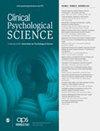Repetitive Negative Thinking Mediates the Relationship Between Sleep Disturbance and Symptoms of Generalized Anxiety, Social Anxiety, Depression, and Eating Disorders in Adolescence: Findings From a 5-Year Longitudinal Study
IF 4.1
2区 医学
Q1 PSYCHIATRY
引用次数: 0
Abstract
Sleep problems commonly co-occur alongside generalized and social anxiety, depression, and eating disorders in young people. Yet it is unclear if sleep disturbance conveys risk for these social-emotional disorders across early to middle adolescence and whether repetitive negative thinking (RNT) mediates this association. In this study, we examined longitudinal relationships between sleep (morning/eveningness, school-night sleep duration, and sleepiness), general and presleep RNT, and symptoms of generalized and social anxiety, depression, and eating disorders across 5 years. As part of the wider Risks to Adolescent Wellbeing Project, these constructs were assessed in a cohort of 528 youths over six annual waves of data collection, spanning ages 11 to 16. Cross-lagged panel models that examined direct, indirect, and bidirectional associations showed that worse adolescent sleep predicted increases in symptoms of generalized anxiety, social anxiety, depression, and eating disorders across each wave directly and indirectly through general and presleep RNT. Symptoms of social-emotional disorders did not predict worsening in sleep. Results suggest that sleep disturbance and RNT should be targeted simultaneously in the prevention and treatment of social-emotional disorders in adolescence, although limitations around the use of self-report and nondiagnostic symptom measures are noted.重复性消极思维可调节睡眠障碍与青少年广泛焦虑、社交焦虑、抑郁和饮食失调症状之间的关系:一项为期 5 年的纵向研究结果
睡眠问题通常与青少年的广泛性焦虑症、社交焦虑症、抑郁症和饮食失调症同时出现。然而,目前还不清楚睡眠障碍是否会在青春期早期至中期传递这些社交情感障碍的风险,也不清楚重复性消极思维(RNT)是否会介导这种关联。在这项研究中,我们考察了睡眠(早睡/晚睡、学晚睡眠时间和嗜睡)、一般和睡前 RNT 与 5 年内广泛性和社交性焦虑、抑郁和饮食失调症状之间的纵向关系。作为更广泛的 "青少年幸福风险项目 "的一部分,我们对一组 528 名青少年进行了这些方面的评估,每年收集六次数据,年龄跨度从 11 岁到 16 岁。研究直接、间接和双向关联的跨滞后面板模型显示,青少年睡眠质量下降直接或间接地通过一般和睡前 RNT 预测了广泛性焦虑、社交焦虑、抑郁和饮食失调症状在每个波次中的增加。社会情感障碍症状并不能预测睡眠的恶化。研究结果表明,在预防和治疗青少年社交情感障碍时,应同时针对睡眠障碍和RNT进行治疗,但也指出了使用自我报告和非诊断性症状测量方法的局限性。
本文章由计算机程序翻译,如有差异,请以英文原文为准。
求助全文
约1分钟内获得全文
求助全文
来源期刊

Clinical Psychological Science
Psychology-Clinical Psychology
CiteScore
9.70
自引率
2.10%
发文量
35
期刊介绍:
The Association for Psychological Science’s journal, Clinical Psychological Science, emerges from this confluence to provide readers with the best, most innovative research in clinical psychological science, giving researchers of all stripes a home for their work and a place in which to communicate with a broad audience of both clinical and other scientists.
 求助内容:
求助内容: 应助结果提醒方式:
应助结果提醒方式:


